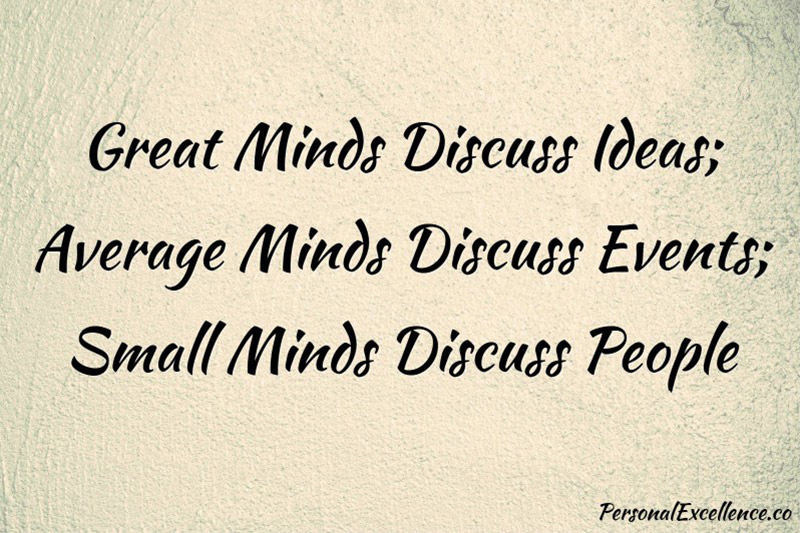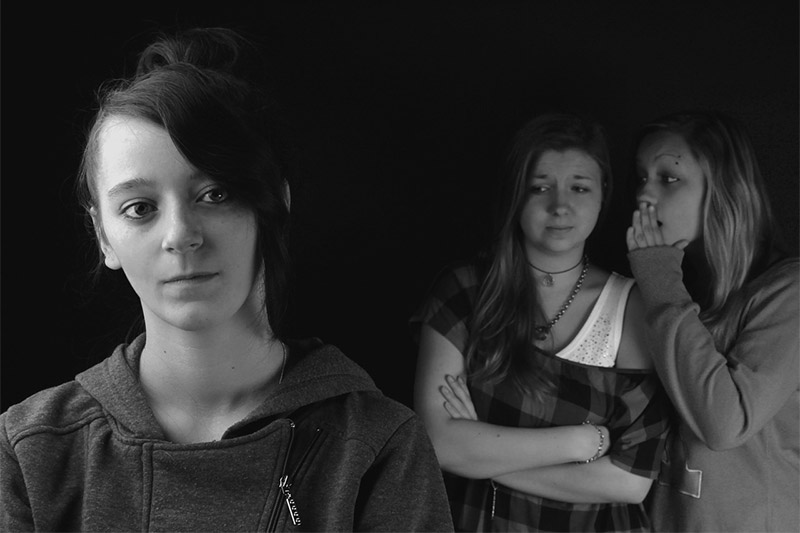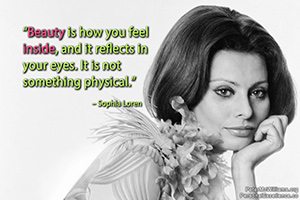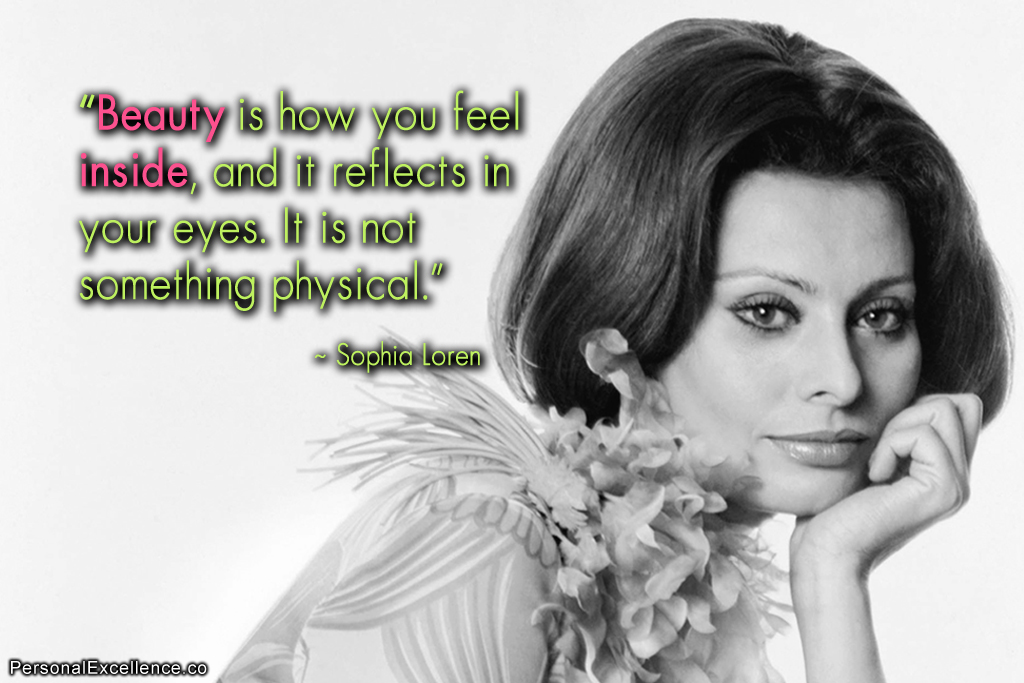
“Great minds discuss ideas; average minds discuss events; small minds discuss people” is a quote often attributed to Eleanor Roosevelt, an American activist. What does it mean?
Let’s start by defining “ideas,” “events,” and “people” first.
- Discussing people means talking about a person, typically in a negative, gossipy way.
- Discussing events means talking about current events, such as local news or events happening around the world.
- Discussing ideas means talking about higher-level messages and concepts. Understanding the messages behind an event, dissecting human thought and behavior, looking beyond what’s there, and finding solutions to help the world.
Small Minds Discuss People

(Image: Baruska)
When the quote says “Small minds discuss people,” it means that people who discuss others as an end in itself are small-minded and shallow.
Unfortunately, a large segment of the media and our population today dedicate themselves to discussing people. We have tabloid magazines, celebrity gossip sites, and people who follow celebrity gossip like it’s the central goal in their lives. Office politics happen in many places, with co-workers who backstab and badmouth others. Even politicians from wealthy, developed nations make personal attacks and conduct smear campaigns in their political campaigns today. Online, we see people shaming or attacking other people from time to time, with others supporting such behavior and joining the attack rather than taking the high ground.
Average Minds Discuss Events

(Image: Angelo Giordano)
The next part of the quote is “Average minds discuss events.”
When you switch from discussing people to events, there is an improvement because you stop talking about people but instead focus on events. There is an element of objectivity as you’re now looking at hard facts and figures. You also become more informed about what’s happening in the world.
Yet it is a fallacy to think that simply discussing events makes us smarter.
Firstly, many news stories (depending on where you live) are heavily censored according to the news media’s ideology and alliances. There are many countries where the government controls the media. Powerful corporations often have the same people sitting on their boards as the boards of media outlets. So when you read the “news,” you’re really reading news that has been curated to fit what the news outlet wants you to know, along with cherry-picked information and statistics. Something to consider when you think that you’re being educated by a particular news outlet — it’s likely that they are shaping your thinking to fit what they want you to think.
Secondly, news media tend to sensationalize and report on the most shocking stuff. In internet terms, it’s called “clickbait.” As the saying goes, “When a dog bites a man, that is not news, because it happens so often. But if a man bites a dog, that is news.” Hence, even though there are one billion possible things to report on each day, including countless positive stories and consciousness-raising events, the stories that a news outlet reports on are rarely the most important, most positive, or most enriching, but rather some of the most negative, outrageous, and fear-based stories you can ever find.
Thirdly, even though we may be shocked by a grisly murder that just happened, we have to bear in mind that murders, crimes, and even war happen every single day. But when you read the news, your attention gets directed to that one crime or that one murder. Or when a news channel repeatedly highlights the crimes and disasters that happen in a country, perhaps for political purposes, it creates the notion that the place is highly unsafe, when 99.999% of its people get by perfectly safely each day.
In the process of being caught in fear, anger, or shock, we miss the bigger picture. The irony is that by thinking that we are educating ourselves by reading the news, we are isolating our minds and forming an extremely skewed image of the world based on what the news outlet is telling us. We are associating life with fear and terror, yet missing the whole point which is, “How can we solve the issues that we see?”
Great Minds Discuss Ideas

(Image: qimono)
This brings us to the last point, “Great minds discuss ideas.”
As someone becomes more curious about the world and looks beyond what’s immediately visible, they start to talk about not just people or events, but ideas. For example:
- Why people do the things they do. What drives them.
- Why events like murder, mass shootings, war, and crimes happen. What we can do to prevent such violence.
- How we can uplift others.
- How we can improve as people.
- World issues, because we’re not just citizens of a country but the world.
- Whether the direction we’re moving in, as a society and as a world, is good for us.
- How to improve the world.
Discussing ideas means not just taking what is presented to you at face value, but digging deeper. Understanding root causes of events. Understanding how something came to be. Questioning assumptions. Identifying solutions.
The quote “Great minds discuss ideas; average minds discuss events; small minds discuss people” is of course meant as a generalization. People and events are often proxies to discuss ideas. We look upon people like Nelson Mandela, Martin Luther King Jr., Buddha, Mother Teresa, Mahatma Gandhi, and Oprah Winfrey as inspirational figures for change. We discuss people as a way to understand each other. Discussing events helps us grow in awareness; current affairs are a way to learn about the world. If something just happened in my life and I share this with a friend, that’s part of conversation, of relating to each other.
The problem comes when we talk about people or events as an end to themselves. This quote reminds us that when we bad-mouth others, gossip, or follow the news reactively, it doesn’t bring us anywhere. Complaining or chit-chatting about people/events endlessly will not change our lives or make us smarter.
But by focusing on understanding ideas and creating solutions for change, it will. Assuming that we act on them of course.
How To Have a Great Mind: 8 Tips
This means:
- Understand the root cause. Dig deep to understand what lies beneath the surface.
- Expand your mind. Don’t just follow the news blindly. There is a world of information out there. Expand your mind to soak in information from all sources, from Wikipedia (which can be biased but it’s a good start) to different news sites to YouTube commentary channels to books on Amazon and Kindle. Expose yourself to different points of views. Once you do that, you’ll realize how certain news media can be biased and narrow in scope.
- Stay away from gossip. Even though people may gossip about you, it doesn’t mean that you need to gossip about them. Take the high ground and focus on helping those who care about you instead.
- Focus on the issue, not the person. If you don’t like what your boss, co-worker, or friend did, focus on the issue, not the person. Give constructive criticism without attacking someone. Read: How To Give Constructive Criticism: 6 Helpful Tips
- Seek out those with intelligent opinions. Follow them. Read their updates to learn from their way of thinking. Bookmark articles that get you thinking. Reading an intelligent article 10 times is better than reading 20 low-level news stories any day.
- Recognize and understand world issues. We’re not just a citizen of our country but the world. Climate change is real. So is the absurd amount of waste we produce daily and the immense pollution we generate as a result. Same for cruelty in the meat industry. While these issues may not affect us directly yet, we need to draw the link between our daily actions and such global issues, because there is a link. As conscious beings, there comes a point when we need to think about life beyond us, because at the end of the day, the world is ours to care for and protect.
- Don’t talk about events as an end to itself. Understand them. Why is this event happening? When did it first start? What’s causing it? What can we do about it? For example, if there’s a mass shooting, beyond getting horrified, think about what you can do to change things. If you see news on a suicide, don’t just react and talk about it as conversation fodder, but learn more about the causes, overall statistics surrounding this, and why people in the modern world today are turning to suicide despite having the facilities and resources that people in undeveloped countries don’t. Dig in to understand patterns, rationales, and root causes.
- Focus on solutions. Finally, identify solutions. Find ways to change the world in a positive way. What can you do about the problems you see today? What can you do to help others, make an impact, and save the world? Read: One Man’s Impact On The World
Reflect on what you talk about daily:
- Do you tend to discuss people, events, or ideas?
- How can you spend more time discussing ideas on how you can improve your life, help others, and change the world?
Check out:









 Thanks for reading. If you like my free articles, join my private email list and get my latest updates and articles sent right to your inbox.
Thanks for reading. If you like my free articles, join my private email list and get my latest updates and articles sent right to your inbox.